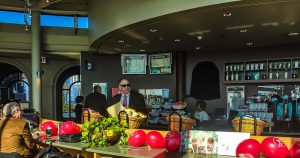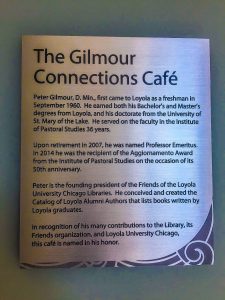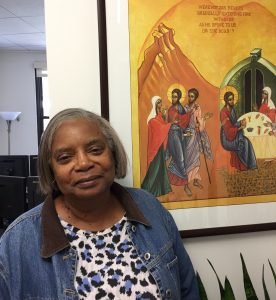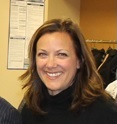
 Peter Gilmour, D. Min, Professor Emeritus at IPS and recipient of the IPS Aggiornamento Award in 2014 was recently honored at the naming of Connections Café, to Gilmour’s Connections Café. Peter Gilmour Is a Loyola alum (BS ’64, MRE ’71) and has been involved with Loyola’s Institute of Pastoral Studies since inception in 1964. Please read his speech below and take a look at the pictures from the dedication. Peter can be frequently seen hanging out in the café, and we hope you’ll make a stop over there and enjoy some coffee and good conversation. Gilmour’s Connection Café can be found in between the Information Commons and Cudahy Library at the Lake Shore Campus.
Peter Gilmour, D. Min, Professor Emeritus at IPS and recipient of the IPS Aggiornamento Award in 2014 was recently honored at the naming of Connections Café, to Gilmour’s Connections Café. Peter Gilmour Is a Loyola alum (BS ’64, MRE ’71) and has been involved with Loyola’s Institute of Pastoral Studies since inception in 1964. Please read his speech below and take a look at the pictures from the dedication. Peter can be frequently seen hanging out in the café, and we hope you’ll make a stop over there and enjoy some coffee and good conversation. Gilmour’s Connection Café can be found in between the Information Commons and Cudahy Library at the Lake Shore Campus.
Mellow Coffee and Strong Conversation
Remarks by Peter Gilmour at the dedication of Gilmour’s Connections Café at Loyola University Chicago, April 12, 2017.
“I’ve heard it said that near death experiences bring on a sudden review of one’s life. Seeing you all here this morning brings on a flashback of my own life, but, thankfully, without a near death experience. I’m delighted to be here today with my cousin Joan, former students from St. George High School, Loyola faculty and staff, friends from the Sheil Catholic Center, and yet others from near and far. And to think this is happening during National Library Week. Thanks for celebrating this moment as we sip mellow coffee and strong conversation.
I have lingered at Loyola for 3/4th of my life now, from undergraduate student to Professor Emeritus. I have witnessed and been part of many changes these past 57 years. And now, another change, naming this cafe Gilmour, a name I share with other family members who attended Loyola — my father, my brother, and my cousin.
 So Loyola is alive and thriving because of change.
So Loyola is alive and thriving because of change.
If people and institutions don’t change, rigor mortis sets in, a sure sign of death. Coffee houses and this café are great examples of change. In 1677, an Oxford academic by the name of Anthony Wood complained about coffee houses: “Why doth solid and serious learning decline, and few nor none follow it now in the University?” His answer: “Because of Coffee Houses, where they spend all their time.”
When I was an undergraduate, the only type of cafes were neighborhood greasy spoons: the Pantry, Standees, and the infamous Cindy Sues located on what is now the Loyola Plaza in front of the el station (Loyola graduate and noted Chicago author Stuart Dybek sets his short story “Tea Ceremony” at Cindy Sues that appears in his recent book, Ecstatic Cahoots). Here in this library you were not allowed to bring food or drink into the building, and silence reigned supreme. Today, in the heart of this library and information commons, this café serves up what used to be contraband — mellow coffee and strong conversation — now within the heart of the university!
Yes, change keeps thing alive and vibrant.
I am so grateful for the opportunity to have been present at the creation of the Institute of Pastoral Studies back in 1964, and having been part of it for my entire career. I met the most fascinating and dedicated students from near and far in my courses through the years. My many colleagues were a source of inspiration to me. And I never would have been able to research and publish without their ever ongoing encouragement coupled with this university’s fine library services, and the research leaves and grants Loyola awarded me.
Since my retirement, I have devoted time to the promotion of the Loyola libraries through serving on the Friends of the Libraries Board. My special interest has been to develop a catalog of Loyola Alumni who have published books. This ongoing and never ending project has identified close to 400 alums who have written more than 800 books.
Thank you Loyola University for all these opportunities to further its mission, give me such a fascinating series of personal and professional experiences, and, today, for the honor of this café now named Gilmour. I am forever grateful for this connection to mellow coffee and strong conversation.
That’s one thing that will not change!”
Below is a video and Dr. Peter Gilmour receiving the 2014 IPS Aggiornamento Award:
https://youtu.be/yVg1udU7acY
**Photos 1 and 3 borrowed from Loyola University Chicago University Libraries Facebook page.







